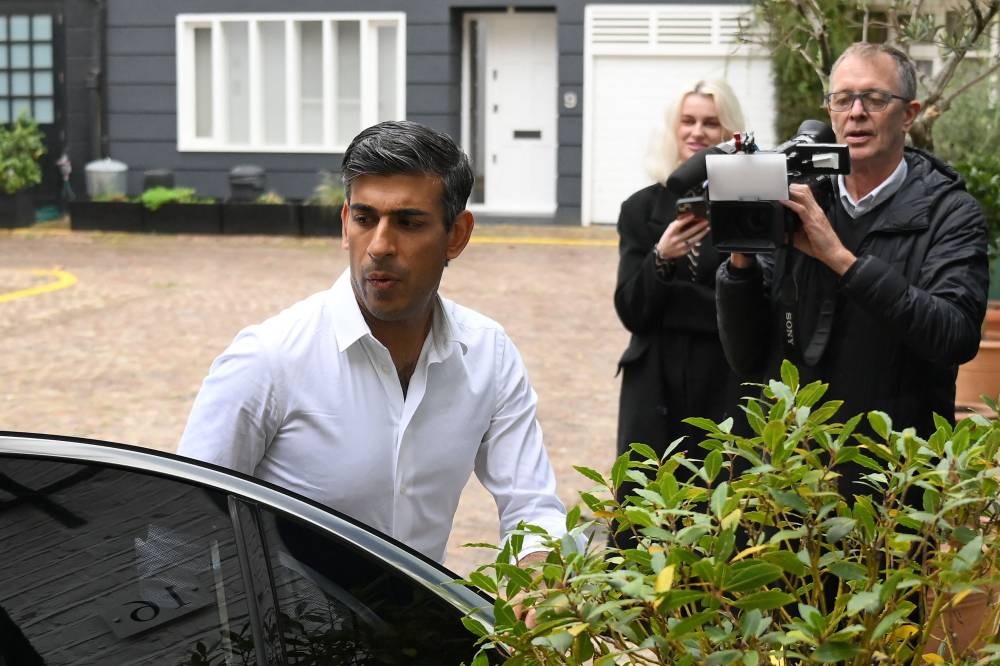OCTOBER 23 — Former British prime minister Johnson flew home from a Caribbean holiday reportedly to launch an audacious political comeback only weeks after he was forced to step down.
Johnson has said nothing publicly about a bid for his old job but he and his Conservative party rival Rishi Sunak have been reported to have held face-to-face talks late on Saturday.

The divisive 58-year-old Johnson, the Brexit architect, only relinquished power in early September, two months after announcing his resignation following a government revolt over a slew of scandals.
Conservative MPs who applauded Johnson’s resignation and departure are now tweeting #BringBackBoris.
The MPs will vote on who should become leader of the party and the prime minister if both rivals secure 100 nominations. The result will be announced on Friday. If Boris is the choice, he will take the oath of office before the new monarch, King Charles III.
We recall that it was prime minister Johnson who in August 2019 advised the current monarch's mother, the late Her Majesty Queen Elizabeth II that Parliament should be prorogued from a date between September 9 and 12 until October 14, 2019.
On August 28, 2019 Parliament was accordingly prorogued. The prime minister’s decision to prorogue Parliament was challenged in two sets of proceedings, one in Scotland (‘the Cherry case’) and one in England (‘the Miller case’). On September 4, 2019 the Scottish Court of Session refused the petition in the Cherry case, on the ground that the issue was not justiciable in a court of law. The petitioner appealed.
The English High Court also dismissed the claim in the Miller case on the ground that the issue was not justiciable. It accepted the government’s submission that the courts should not enter the political arena but should respect the separation of powers. It held that the prime minister’s decision that Parliament should be prorogued at the time and for the duration chosen, and his advice to Her Majesty to that effect, were inherently political in nature, and there were no legal standards against which to judge their legitimacy.
The High Court’s judgment was delivered on September 11, 2019. On the same day, the Scottish appellate court delivered its decision that the petitioners’ appeal in the Cherry case would be allowed. It held that the advice given to Her Majesty was justiciable, that it was motivated by the improper purpose of ‘stymying’ Parliamentary scrutiny of the executive, and that it and the prorogation which followed it were unlawful and thus null and of no effect.
The Advocate General in the Cherry case and the claimant in the Miller case appealed to the United Kingdom Supreme Court. Both cases raised the same issues: (i) whether the prime minister’s advice to the Queen was justiciable in a court of law and, if it was, by what standard its lawfulness was to be judged; (ii) whether, by that standard, it was lawful; and (iii) if it was not, what remedy the court should grant.
In view of the grave constitutional importance of the matter, and the disagreement between the courts in England and Wales and Scotland, the Supreme Court convened a panel of 11 Lord Justices (judges) – including the President and Deputy President of the Court – the maximum number of serving Justices who are permitted to sit.
The Supreme Court delivered its decision on September 24, 2019. The apex court unanimously allowed the appeal in the Miller case and dismissed the appeal in the Cherry case for the reasons that:
(1) the decision of the prime minister was justiciable;
(2) the prime minister’s decision was unlawful as having the effect of frustrating or preventing the constitutional role of Parliament in holding the government to account and there had been no reasonable justification for the action which had such an extreme effect upon the fundamentals of democracy; and
(3) the prime minister’s advice and the actual prorogation to which it had led were unlawful, null and of no effect.
Prorogation is a prerogative power exercised by the monarch – an absolute one – who acts on advice. The monarch in Malaysia, however, is a constitutional one. His Majesty's powers are set out by the constitution.
In the case of Tan Sri Musa bin Hj Aman & Ors v Tun Datuk Seri Hj Panglima Hj Juhar Hj Mahiruddin & Ors [2021], the Court of Appeal referred to the Federal Court case of Dato’ Sri Ir Hj Mohammad Nizar bin Jamaluddin v Dato’ Seri Dr Zambry bin Abdul Kadir (Attorney General, intervener) [2010], which explains the application of the constitutional provisions on dissolution of legislative assemblies, and held that the decision whether or not to dissolve the legislative assembly is in the absolute discretion of the monarch. The monarch does not act on advice of the executive in the matter of dissolution of the assembly.
Even though the Court of Appeal was of the view that provisions in the constitution could be argued, litigated and determined for their effect and applicability, at the end of the day, the dissolution of a legislative assembly “is a non-justiciable subject and consequently not amenable for judicial review.” It is a matter not suitable and appropriate for its review before the courts.
It appears that even if the advice or request for the dissolution of a legislative assembly could be argued and litigated as being unlawful, the monarch has the discretion to dissolve the assembly.
Accordingly, the dissolution of legislative assemblies is not justiciable.
Happy Deepavali and Happy Holidays.





















